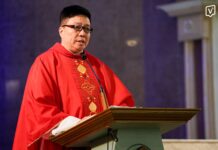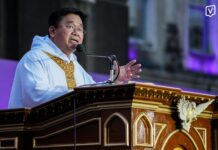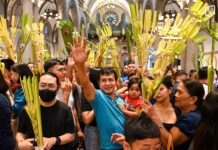THE UST Institute of Religion is set to implement a streamlined theology curriculum in Academic Year 2018 to 2019.
The Institute of Religion moved two subjects that weigh three units each to the UST Senior High School (SHS) and added a new three-unit course to the college curriculum.
From 15 units or five subjects, the curriculum for college students will be trimmed to 12 units or four subjects.
The “Salvation History” and “Church and Sacraments” courses that were originally taught in college will now be taught in SHS. The two courses will replace the course taken by SHS students titled “Fundamentals of Faith.”
The new curriculum for college students consists of “Christian Vision of the Human Person,” formerly known as Christian Ethics; “Christian Vision of Marriage and the Family,” formerly known as Marriage and Family; “Christian Vision of the Church and Society,” formerly known as Social Teachings of the Church; and the new course titled “Living the Christian Vision in the Contemporary World,” which will tackle the dialogue with culture, faith, nature and other religions.
Allan Basas, a professor from the Institute of Religion and one of those who designed the new curriculum, clarified that despite the changes, relevant themes from the old courses in college would still be taught in the new curriculum.
“The themes that are pertinent to Salvation History and Church and Sacraments, they will still be tackled in the Theology courses that we have,” Basas told the Varsitarian.
Basas said all the courses carry “Christian Vision” in the titles as everything on the curriculum and teaching methods would be Christian-centered.
The new curriculum will make Thomasians respond better to new teaching methods to be applied by UST Theology professors, he said.
“What we envisioned here is the integrating faith and context in the light of the gospel,” he added,” Basas said.
Outcomes-based education model
The revised curriculum will adapt an outcomes-based education (OBE) model, which is a system of organizing curricula and evaluating students based on measurable outputs produced.
Theology professor Ser Allan Bodoraya said today’s changing times have shifted how students think, a trend from which the Institute of Religion drew the decision to change the old curriculum and teaching methods.
“Sa pagtuturo ko, I really need to know the student before I teach because sometimes ‘yung mga sinasabi ko di na nila [naiintindihan] so kaming mga professors kailangan din namin sumabay o makibagay para maintindihan ‘yong saloobin ng mga estudyante,” Bodoraya told the Varsitarian.
“Hindi mo naman iisipin na paano ko matuturo `to na mas madali? Parang ang iisipin mo doon, ano `yong maituturo ko na […] would be relevant to the students,” he added.
The new curriculum, through its application of OBE, seeks to enable Theology professors to monitor if the students respond well to Church teachings.
Bodoraya said the new set of curricula for both college and SHS students would be unique and would make them become “more Thomasian.”
“Nagkakaroon na siya ng Thomasian identity,” Bodoraya said in an interview with the Varsitarian.
The new Theology courses will also cover community development activities in partnership with the Center for Campus Ministry and UST-Simbahayan, during recollections in the first and second years.
The Institute of Religion started drafting the revised Theology curriculum in September 2015 following the approval of the Council of Regents of the review of the old Theology curriculum.
‘OBE problematic’
Basas said adapting the OBE model was the challenge that the designers of the new curriculum encountered.
“We tried our best to adapt it to an OBE model. Siyempre, hindi naman siya perfect na OBE model kasi again we have to take note that it’s a work in progress,” he said.
“Kasi sa OBE as we saw it at that time, dapat measurable, `yung mga outcomes, kaya lang kasi pag tiningnan mo sa Theology, how do you measure `yung mga outcome `pag faith iyong tinuturo mo `di ba?” he added.
Department of Philosophy Chairman Paolo Bolaños said that while standardizing OBE in the Theology curriculum would make activities and outcomes clear, Catholic teachings cannot be measured by outputs.
“Ano ba ang specific outcome for you to become what? A good Catholic? But how can you measure that? You cannot measure it with figures or grades,” Bolaños told the Varsitarian.
Bolaños also stressed that being a “good Catholic” is not a skill, but a value that should be upheld.
Bodoraya argued that while professors need to grade students through tests and outputs for evaluation, it would not be enough for students to merely recall lessons. The lessons should be applied.
“Now even the process of coming up with outcomes, dapat may gabay ng mga professors. Pero hindi sapat kasi ang memorized lang, dapat totoong naa-apply sa reality,” he said.














